#Luna also goes by any pronouns if anybody wants to know
Text

HAPPY HALLOWEEN!!!
This was inspired by this picture I found @nightfurmoon:
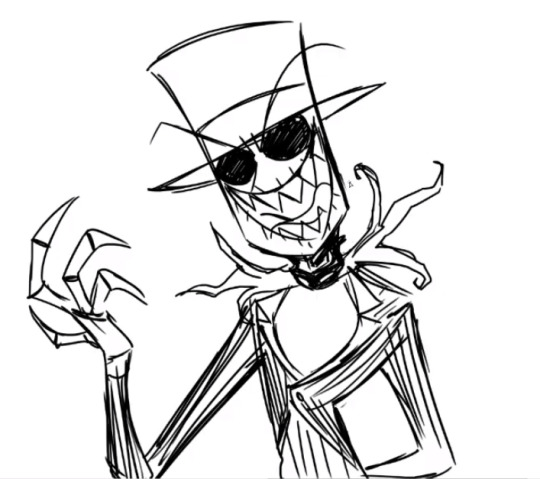
#sorry new cm followers (especially criminalskies) but i also make villainous content too#anyways wanted to draw Black Hat and my oc Luna together#so i drew them as Jack and Sally for Halloween#Luna also goes by any pronouns if anybody wants to know#black hat#villainous#oc: luna#not cm#my art#a warning: there will be more of these two in the future so in advance i'm sorry#of course i'll still makes cm content#it'll just be back and forth between these two fandoms
23 notes
·
View notes
Text
Review #1: Animal Crossing: New Horizons (ACNH)
With Isabelle as my avatar, this only felt appropriate as my first review! (Please note that I am speaking only to the content of the game itself, not the fanbase, fan works, or other unofficial things.)
System: Nintendo Switch
Summary: Play as one of the first residents moving to a deserted island. There, you can engage in activities such as making friends; catching bugs, fish, and sea creatures; filling out your museum; creating clothing, flags, and town tunes; decorating your house; and gardening.
Overall: ACNH presents somewhat of a utopia for many of us: freedom and safety. Beyond that, it’s cute and the islanders have many funny lines. There are also many things for you to collect, but there’s nothing forcing you to engage in parts of gameplay that don’t interest you once you’ve done enough to unlock everything. Gendered personality types and a lack of variety in female NPCs remain, but allowing your character to be as GNC as you’d like is a nice step toward removing gender roles.
---
Tests (see terms list for explanation):
Anti-Freeze: Pass. No characters are injured or killed, barring the player character hitting them with a net or something.
Bechdel: Pass, to the small extent NPCs talk to one another.
Mako Mori: N/A as there are no narrative arcs.
Sexy Lamp: Pass, although there’s no real plot.
Please choose your style.
Let’s start with a big talking point in certain circles: “Please choose your style.” In the original -- and most likely every single version of the game except English -- this was a choice between playing as a boy or a girl. They changed it in English due to threats and harassment from TRAs.
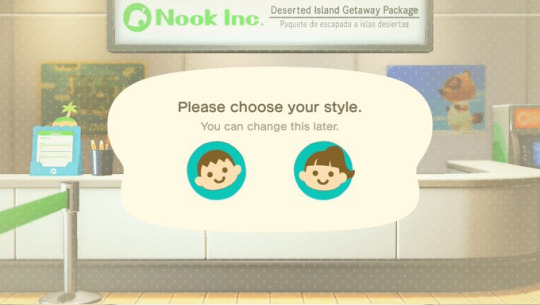
[the choice as it appears in English: “Please choose your style. You can change this later.”]
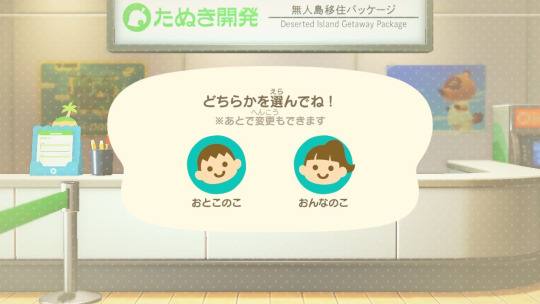
[the choice as it appears in Japanese: “Please choose one! *You can change this later. boy / girl”]
The odd thing about the fuss around this is that it actually functionally does not matter whatsoever. I don’t think I’ve seen it come up even once in dialogue. That said, I’m not sure if other languages’ versions have characters refer to your character’s sex. On the bright side, it does mean that male and female player characters would be talked to and about in the same way. On the other hand, there was never a problem of animals treating you differently based on your sex in previous games anyway that I ever saw, so to see it that way is fixing a problem that didn’t exist in the first place.
I’ve noticed that the animals will use “they” to refer to someone they’re talking about. My guess is actually that this is an ease of programming thing rather than a woke thing. Because Japanese uses personal pronouns quite infrequently, and some of the lines are random ‘fill in the blank with a random islander name’ types of statements, sometimes previous English releases ran into a problem where the translators had no way to know whether the character would be referring to a man or a woman, and iirc, seemed to go with male by default... Ironically, using “they” is incorrect 100% of the time, though.
Self-Expression
Unlike previous games in the series, your character’s facial features and beginning hairstyle options are not determined by your character’s sex. It’s a nice change of pace that your character can be as GNC as you’d like from the beginning, although your starting outfit may be somewhat gendered. You also can freely change between hairstyles and facial features whenever you want once you’ve acquired a mirror, so you aren’t locked into one type of self-expression.
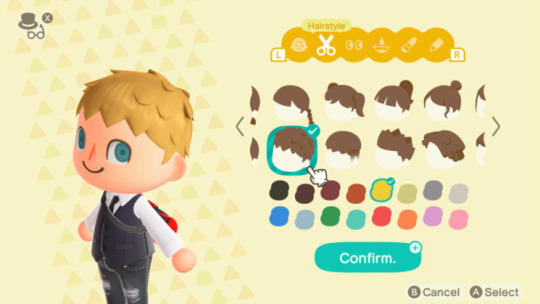
Also, any player character can wear any outfit without commentary. In New Leaf (the previous main-series game), you could wear anything as well, but some clothing options were gendered. For example, Labelle (the porcupine who sold accessories) might say things along the lines of, “That’s made for women, [player name], so it’ll look good on you!” or “That’s usually made for men, but I bet you can pull it off, [player name]!” In New Horizons, these lines are no longer present, at least that I’ve seen in the English version.
In terms of self-expression, I see these as strengths. There’s nothing in the game that encourages or discourages “feminine” or “masculine” expression for anybody.
Gendered Personalities
While gender roles do not apply to the player character, they can be seen in the NPCs.
One thing I will say in the series’ defense is that in the Japanese versions of the game, every personality type uses a different personal pronoun. In Japanese, personal pronouns are almost all quite gendered and, in fiction, tell you a lot about the character’s personality. It would actually feel a bit formal and odd to have all the characters use ‘watashi’ (a less gendered personal pronoun, but for men I think it’s a bit formal). Each personality type has a different pitch to their voice, with higher pitches for female personalities and lower pitches for male personalities, too. None of these are insurmountable barriers if they committed to breaking free of these stereotypes, but they are relevant factors.
The personality types are as follows:
Normal (F): Friendly and kind characters who want to help you out.
Peppy (F): Cheerful, energetic characters. They may come across a bit “ditzy.” They dream of being idols (actresses/singers in English).
Snooty (F): Haughty, vain characters who value fashion and beauty. They can be standoffish at first, but are loyal friends once you’ve gotten close to them.
Big Sis (F): Similar to normal types, but more mature.
Jock (M): Athletic characters who are obsessed with sports and muscles. They can often come across as lacking in intelligence and one-dimensional.
Cranky (M): Rude, standoffish characters, though they can be protective and kind once you’ve befriended them.
Lazy (M): Most likely self-explanatory. Lazy characters want to lounge about and not work too hard, mentally or physically.
Smug (M): Conceited, ostensibly "charming” characters.
Overall, the female personalities are kinder and more intelligent. However, even this “positive stereotyping” is still putting us in a box, and these “personalities” are indeed very much stereotypes.
The situation with special characters (shopkeepers and such) aren’t much better. There are a variety of male special characters with a variety of different traits: intelligent with good business sense, sneaky, timid, friendly, daydreamer, cheerful, artistic... Meanwhile, female special characters are basically sweet, shy, and/or fashionable. The only exceptions that come to mind are Saharah (who was a man in the Japanese version, but changed to a woman back in the original GameCube game due to long eyelashes, I can only assume) and Luna (who has so few lines it’s hard to even describe her personality).
On the bright side, ACNH did get rid of the gendered speech bubbles. It used to be that male villagers’ names would have a blue background and female villagers’ would be pink, save for special characters for whom it would be green. Now in ACNH, the color seems to be determined by the character’s aesthetic, which is a nice change.
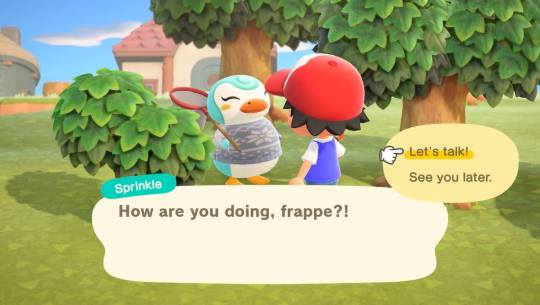
Little to No Sexualization
Unlike many forms of media, ACNH is pretty free of sexualization as far as official content goes. (Obviously the internet is another story entirely, but that’s not Nintendo’s fault.) Only one character has any form of secondary sex characteristics (Luna has breasts), and while I question the need to give a tapir breasts, her outfit is modest, there are no “jiggle physics,” and there are no sexualizing camera angles or dialogue.
I’ve heard that the smug characters flirt with the player character. I don’t like them so I can’t say with confidence whether this remains true in ACNH, but as far as I saw in New Leaf, all they said in that regard would be like “you’re looking as cool as a cucumber.” It was enough to weird me out, but still, it’s obviously quite tame.
I haven’t seen any official* clothes that are sexualizing, and there are many clothing options that aren’t heavily gendered. (*I’m sure someone somewhere has designed clothes that are sexualized, nude, whatever, using the clothing design feature. I don’t think this is technically allowed by Nintendo, so if you encounter this you are able to report it however.)
1 note
·
View note
Text
Top Books of 2016
Hi Y’all,
This has been a HORRIBLE reading year for me. I had a lot of (mostly bad) Life Events and therefore spent a lot of year having neither the time nor the concentration to read. So I only ended up reading about 25 books. But the good news is that I didn’t have a quantity goal this year. Rather, I decided to only read books with queer characters (LGBTQ+, which in practice unfortunately ended up mostly LGT -- though a lot of polysexual characters came up toward the end!). And a bunch of them were either badly-written or included pretty bad representation. But I managed to pick a surprisingly large number of books that were actually worth recommending. So here’s my top NINE of this year, in basically no particular order, except for my top two.
Hero by Perry Moore.
This one has a gay protagonist, and that’s certainly a part of the story - but our Thom has a lot more going on in his life than just coming to terms with his sexuality. Mainly the fact that he has superpowers and has become buddy-buddy with an elite superhero team that his dad (a former hero) used to be part of and now has negative feelings toward. There’s also the fact that Thom’s mom left he and his dad.
I enjoyed this book partially because there’s a lot more to it than just a coming out narrative and also because it doesn’t shy away from other huge issues. Racism is a large part of one character’s backstory, another character has cancer and both are treated seriously but without being used in a way that feels exploitative. Rather, these characters issues are used to contrast Thom’s and put his own situation into perspective.
Recommended for: Social justice clerics and MCU fans.
Own Voices?: Yes. Perry Moore was openly gay.
George by Alex Gino
George has been talked about a lot in certain corners of the internet, and it’s really no wonder why. The book’s a middle-grade book with a trans protagonist. Seriously, George (who has spent her first day out as Melissa by the end of the novel) is a 10-year-old trans girl. It’s just about as heart-breaking as you can imagine, with our elementary schooler protagonist encountering issues with gender roles, most prominently that she wants the part of Charlotte in her school’s production of Charlotte’s Web but is denied the part for unfortunately obvious reasons.
But it’s also really optimistic. Melissa’s mom and brother don’t really get her dysphoria, but they’re earnestly trying to, which is a great first step. And her best friend is wonderful. While some bad things happen to Melissa over the course of the book, the end makes it seem like her story is set to continue in an upward trajectory.
Recommended for: Miniature humans confused about their gender and people who love them.
Own Voices?: Alex Gino is genderqueer and uses they/them pronouns whereas Melissa uses she/hers. So both are trans, just different variations thereof. So I’m gonna go with yes again here.
Saving Hamlet by Molly Booth
Full disclosure: This book was written by a friend from college. But know that I wouldn’t put it on this list if it wasn’t genuinely great. Sometimes I legitimately forgot that it was written by someone I know because it was so polished (as it should have been, it was published by Disney Hyperion) and just GOOD in a way that feels removed from anybody I know personally, if that makes any sense. ANYWAY.
Saving Hamlet tells the story of a girl who falls through a trapdoor and ends up in Elizabethan London during the first production of Hamlet while stage managing her high school’s production of the same play. She needs to deal with all sorts of changes in her life while putting on two productions of Hamlet at once and dealing with TimeTravel!Jetlag.
Our protagonist, Emma, isn’t queer (presumably. She expresses romantic/sexual feelings for several people, all of whom are dudes) - but her best friend is bisexual and actually uses the term. There is also a minor character who turns out to be gay in a minor reveal. The queerness of these characters isn’t really part of Emma’s adventure, but does factor in a way that makes sense. Doubly so because theatre.
Recommended for: Shakespeare geeks and people who would like to see a fresh approach to time travel.
Own Voices?: Molly is a GREAT ally, but as far as I know she’s straight.
Simon VS the Homo Sapiens Agenda by Becky Albertalli
Speaking of queer high schoolers and theatre, there’s also this marvelous book. I FLEW through it, having read the vast majority of it on Christmas and staying up all night on 27th to finish it.
The premise is that Simon, a high school junior, has been having an email courtship with a anonymous guy who also goes to his school. Then he forgets to log out of his email in one of the school library’s computers and someone takes a screenshot of them. Said dude then blackmails Simon. It seems like it could be REALLY deep and dark based on the description. But it’s actually pretty light-hearted and fluffy. Though Simon (and his email not-quite-boyfriend-but-basically-boyfriend) faces anxiety about coming out and gets bullied slightly after, there isn’t any violence against him and his family is pretty damn great.
The email exchanges were all so cute and good to read, and all the teenage characters actually think and talk like teenagers. Several of the characters fuck up in pretty big ways (sexism and racism are also themes in the books), which the narrative takes an understanding but firmly negative attitude toward -- which is exactly what YA should involve, in my honest opinion.
Recommended for: David Levithan fans and people-people.
Own Voices?: Becky Albertalli is married to a dude, which doesn’t necessarily mean anything, but means that if she’s queer it’s not immediately evident if she’s queer. Regardless,she seems like a pretty kickass ally based off her work with LGBTQIA folks as an adolescent psychologist. Also, this interview with her is pretty great and makes me want to be her friend.
Luna by Julie Anne Peters
I’d been meaning to read this book for a while and finally got around to it this year. It’s not perfect by any stretch of the imagination, but it really exceeded my expectations.
Luna is incredibly interesting for a lot of reasons.For starters, the protagonist is the sister of a trans woman dealing with being her sister’s only confidante while trying to navigate normal high schooler problems. Then there’s the fact that ALL the characters in the novel are flawed; the protagonist isn’t perfect, neither is her sister, and her parents are such complicated people. They all take turns being really selfish. But all of them are rendered sympathetic to varying degrees despite being flawed.
Another really cool thing about Luna is that its message is really different from a lot of other earlier LGBT novels (and being published in 2006, it’s definitely on the older side of literature about trans characters). A lot of older stuff tells readers that if people come out and/or transition bad things will happen to them. Whereas in Luna, bad things happen to the eponymous trans character, but the narrative makes it clear that NOT coming out and transitioning is the WORSE option for her.
Recommended for: Close friends and family members of trans folks (though probably not trans folks themselves; this book would make an excellent 101 course, but lacks a lot of nuance). Also, people who want to read about complex familial relationships.
Own Voices?: Julie Anne Peters has a wife, and judging by her work she’s probably a lesbian (though I guess she could be bi? Who knows? If you do tell me?). But she’s not trans.
Cloud Atlas by David Mitchell
This book is so long; it clocks in at almost 900 pages, but it’s so, so worth it.
In case you don’t know about Cloud Atlas, it’s basically a series of interwoven short stories that take place over a freakishly long span of time. Reincarnation is involved and some really cool aspects thread their way through all or some of the stories. There’s some really cool thriller and dystopian stuff and a lot of good characters...one of whom is bisexual (and maybe what we would consider poly?) and whose lover appears in another story much older. Neither of the characters have their queerness at the center of their stories, but it’s still undeniable there.
Recommended for: People who aren’t intimidated and/or enjoy long, era-sprawling narratives. Fans of Margaret Atwood and/or Agatha Christie would enjoy some elements for sure.
Own Voices?: Mitchell is married to a women, so it’s unclear.
Palimpsest by Catherynne M. Valente
This is maybe probably the trippiest thing I’ve ever read. The basic premise of the book is that we follow four protagonists, each of which gain access to a sexually-transmitted fantastical world. Yes, really. If you have sex with someone who has a map on their skin, you go to this world which has a very Lotus Eater effect on a lot of people. It is in turns beautiful and creepy.
Sex being the main driving force behind the plot, there are a wide variety of sexual orientations presented here. We have lesbians, bisexuals, and a wonderful poly triad among other things. I mean, people also have sex with humanized trains and bees (again, yes, really) - but that doesn’t operate in such a way as to minimize the queerness. It won a Lambda, so that’s pretty rad.
That said, please be aware that the book deals with rape and there is a suicide attempt.
Recommended for: Sense8 fans and people who enjoyed The Night Circus.
Own Voices?: Probably? All of Valente’s bios state that she lives with her “partner” specifically, so that to me points to her likely being queer. I’m not 100% sure of that though.
The Amazing Adventures of Kavalier and Clay by Michael Chabon
This book was given to me by a friend a while ago and had been languishing on my bookshelf for a long time. Had I known more about it, it would have been there for a much shorter period of time. It was my second favorite of 2016.
Kavalier and Clay tells the story of two cousins coming of age in the WWII era and becoming comicbook industry icons. The story has some really interesting magical elements that blend brilliantly with the gritty realities of Kavalier and Clay.
Josef Kavalier is sixteen when he leaves his Jewish family behind in Prague and lives with the weight of worrying about their fates for the majority of the novel. Samuel Clay, on the other hand, must deal with the issues inherent in being gay in 1940s America. The novel is written like a biographical text, so we get to know both these characters (both their lovers) fairly well.
Recommended for: Fans of comic books, history, or comic book history. Also, Jewish folks.
Own Voices?: Michael Chabon is married to a woman, but as previously stated that doesn’t prove or disprove anything - it only means that nothing is conclusive. However, Chabon is Jewish.
Everything Leads to You by Nina Lacour
If you’ve seen me at basically any point in 2016, I raved to you about Everything Leads to You. It’s the best. It doesn’t really have any merit as Literature™, but it’s about girls who like girls getting to be HAPPY and there’s more to the book than just the romance. It’s a goddamn miracle. Everything got a lot of hype and it’s really, really well-deserved. It was my favorite of 2016.
Emi has a really rad internship helping design movie sets, and she’s doing her first solo set when she encounters a mystery. And a really pretty lady. Both the mystery and her feelings about the girl in question are both focal points of the book, with the plots twining together and being pretty evenly balanced.
There is no coming out story, since Emi already knows she’s into girls (there’s actually a subplot in which she needs to deal with lingering feelings for her ex). Emi’s experience with being queer is largely positive, but that can’t be said for all the queer characters in the book. The book examines racism (Emi is biracial) and class issues while not making the book ABOUT its social justice dealings.
Recommended for: Girls who desperately want a w/w beach read and art students.
Own Voices?: Yup! Nina Lacour has a wife!
1 note
·
View note